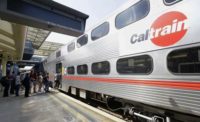President Donald Trump's 2017 federal budget package includes $100 million for upgrades to Caltrain, the San Francisco Peninsula commuter rail line. The proposal renews hope that the project, which was derailed a few months ago when the new administration delayed a final decision, will be able to break ground within months.
The $1.98-billion Peninsula Corridor Electrification Project would install a communications-based overlay signal system positive train control and an advanced signal system and replace diesel trains with electric multiple-unit trains. A total of 51 miles from San Francisco to San Jose would be upgraded. Trains would run at up to 79 mph.
In February, contractors extended their deadline for starting work to June 30 while the agency awaited a decision on the status of $647 million from the Federal Transit Administration. Balfour Beatty is the electrification infrastructure contractor. Stadler US Inc. is the high-performance electric commuter rail train contractor. Martin Ritter, CEO of Stadler US, said that the contract would be "the driving force for the creation of a new railcar production facility in the U.S. that will employ several hundred workers." An estimated 9,600 jobs could be created once construction begins.
Caltrain warned that the delay would "likely require the utilization of up to $20 million in project contingency that otherwise would have been available for construction-related expenses."
The February delay followed a visit to newly appointed Transportation Secretary Elaine Chao by a 14-member delegation of California congressional Republicans who oppose high-speed rail. Believing that the Caltrain upgrade grant would also benefit the HSR project, they urged Chao not to sign the electrification grant authorization and requested that she launch an audit of the bullet train. Democrats followed with a letter urging the secretary to sign off on the upgrade.





